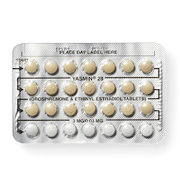Can the pill protect you from ovarian cancer?
Congrats, pill users: Your method's got perks!

First, the bad news: About 12 in 100,000 U.S. women are diagnosed with ovarian cancer each year, making it the eighth most common cancer in women. Yet ovarian cancer is the fifth leading cause of women’s cancer death’s because it has few early symptoms and is often caught after it’s more difficult to treat.
But there’s good news, too: the birth control pill protects against ovarian cancer. A group of scientists in the North Carolina Research Triangle put together all the studies printed after 1990 that look at women using the pill and their rates of ovarian cancer. They looked at 55 studies in all with over 4.6 million women.
So what did they find?
Women who had ever used the pill for birth control were 25% less likely to develop ovarian cancer later in their lives.
The pill offered the strongest protection from ovarian cancer when women used it for a year or longer. Women who used the pill for 10 years were 50% less likely to develop ovarian cancer. The pill’s protective effect lasted for a long time, too—up to 20 years after women stopped taking it.
The researchers didn’t find any differences between pills with different doses of estrogen.
This team is also working on reviewing all the studies that look at positive effects of the pill among women who have a higher risk of ovarian cancer to begin with. Known risk factors for ovarian cancer include:
older age,
never being pregnant,
a family history of ovarian cancer,
a personal history of other cancers, and
having a harmful mutation of the BRCA1 or BRCA2 gene.
We’ll be staying tuned for those results as well…
How do you feel about this article?

Heat up your weekends with our best sex tips and so much more.
